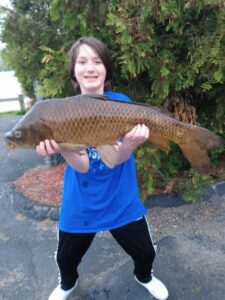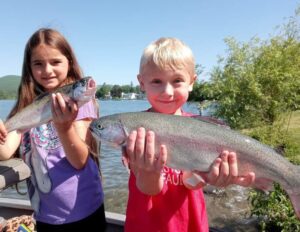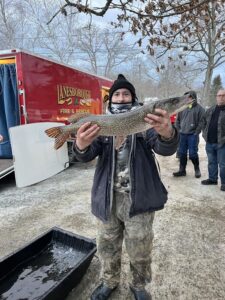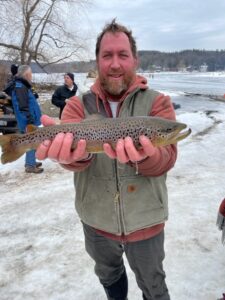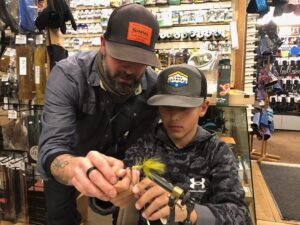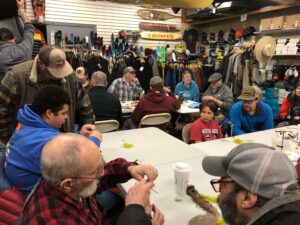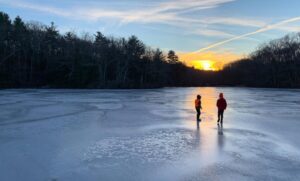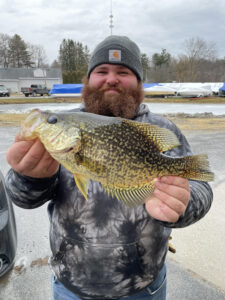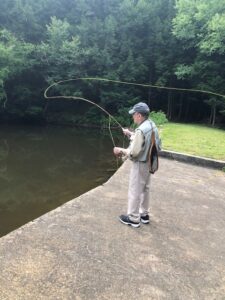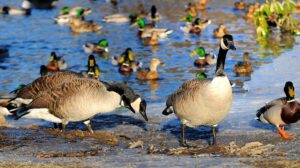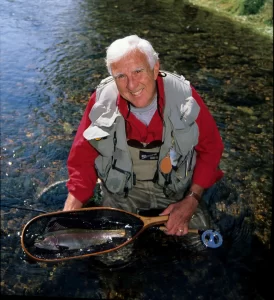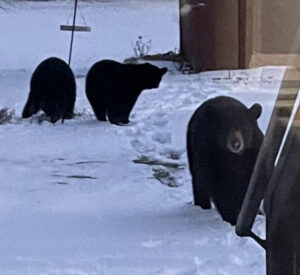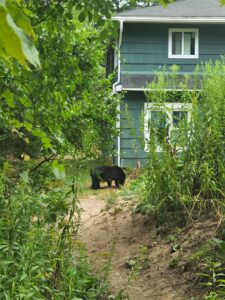At the February 2 meeting of the Berkshire County League of Sportsmen (BCLS) four area outdoor sportspeople/conservationists were selected to receive prestigious awards. The awards will be presented at the Annual Silvio O. Conte Memorial Dinner on Saturday, April 22 at the Cheshire Rod & Gun Club. (More information to come in a later column, such as time and ticket price).
The winners are as follows:
Stephen Sears of Dalton was selected to receive the Sportsman of the Year Award. He is the current Chairman of the MA Fish & Wildlife Board. He has done an excellent job representing his western Massachusetts constituents and those across the state. Fellow members on the Board, the Department of Fish & Game and the Division of Fisheries and Wildlife respect his opinions and have appointed him to serve on several very important subcommittees of the Board.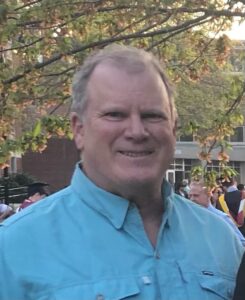
He is knowledgeable in the field of conservation and proper management of our natural resources. He enjoys the outdoors not only as a hunter and fisherman, but also as a hiker, bird watcher, nature photographer, mountain biker, skier, and more. His lifelong love of all aspects of the outdoors comes through very clearly and he is a staunch supporter of many conservation measures.
In the past 25 years he has taken the lead role in protecting multiple significant land parcels in Berkshire County through conservation restrictions with both Mass Wildlife and Mass DCR ensuring that these lands are forever available to all of us.
His current and past board positions with the Massachusetts Outdoor Heritage Foundation, Upper Housatonic Valley National Heritage Area, the Center for Eco Technology “CET”, Grow Dalton, The Mount Greylock Ski Club and the Local Committee such as Notchview Reservation and The Trustees of Reservation makes him a very important member of the Fish & Wildlife Board.
The late Fred Moran of Adams was selected to receive the Lifetime Achievement Award posthumously. Fred was as an avid fly fisherman who ran Points North Outfitters in Adams. For two decades Fred and his wife Marilyn taught hundreds how to fly fish, not only local anglers but quite a few from the Pioneer Valley area. They guided hundreds more on the Deerfield River. Fred was known for collecting antique (bamboo) fishing rods and reels and the building and restoration of fly-fishing rods. He later worked at the Orvis fly rod factory in Manchester, VT. He was a close friend of the legendary local bamboo rod builder, Francis Digger” Degere and became his apprentice.
Fred was an esteemed member of the Taconic Chapter of Trout Unlimited where he and Digger put on rod building demonstrations. Fred and Marilyn were recipients of TU’s Crooked Staff Award, the highest honor that the chapter bestows. He was also a director of the Hoosic River Watershed Association.
Joel Miraglia of Ashfield was selected to receive the Sportsmen’s Appreciation Award. A long-time member of the Ashfield Rod & Gun Club (ARGC), he has served as VP, a Hunter Education instructor for more than 8 years. In the club’s winter and spring fishing derbies he coordinated sponsors, provided prizes, arranged stocking of fish, coordinated the Ashfield Lake House and Sanderson Academy, coordinated with landowners and then afterwards was its Master of Ceremonies. The Club Scholarship Program is largely funded by his efforts raffling a kayak each year – selling tickets at the Club’s booths at the Greenfield Fair, Cummington Fair and also tickets at the Ashfield Festival where the club sells vegetarian chili. The program has provided many scholarships to graduates of Mohawk School in the field of natural resources.
For many years he has run the Club’s pheasant program which included coordinating with the State in young bird delivery, preparing tents, coordinating food services, coordinating schedule for the care and breeding of the birds, coordinating the landowners who let them use their properties, scheduling the stocking and more. Joe was awarded the Russell S Williams Outstanding Service Award.
Eric Dupont of Lee was selected to receive the John Zuber Award for all that he does for the youth programs at the Lee Sportsmen’s Association (LSA). He is an NRA Level 1 Pistol Coach and a Certified Archery Coach. He has grown the .22 Youth Pistol Program from 12 youths to 32. He also has grown the Air Pistol Team. Largely due to his efforts, the winter’s archery program has grown from 63 to 95 youths.
Eric also serves on the LSA Board of Directors and is the Pistol Chairman.
Ashfield Rod & Gun Club Ice Fishing Derby
Depending on ice conditions, the derby is scheduled to take place on Saturday, February 26, from 8:00 am to 12 noon on Ashfield Lake, Buckland Road (just off Route 112). Registration will take place at the Ashfield Lake House Beach. You can park at either the Ashfield Lake House or the Town Beach. Bring your own equipment. Some holes in the ice will be drilled. A warming fire and refreshments will be provided. Awards will take place at 12:00 noon.
Be sure to check the ice thickness prior to going. Contact ARGC president Jack Shea at 413 522 6150 if you have any questions.
Fly Tying
The Taconic Chapter of Trout Unlimited will sponsor a fly-tying event at Wild Soul River, 248 Cole Ave, in Williamstown on Saturday, February 25 at 3:00 pm. People of all skill levels are welcome. Bring your vise and tools, or use theirs. Taconic TU President Justin Adkins will share his favorite super simple Sakasa Kebari wet fly pattern. Mostly used for tenkara fishing, this pattern is great with any gear on our small streams here in Western Mass.
Berkshire Archery Championship
The Stockbridge Sportsmen’s Club is sponsoring a 300 Round Indoor Archery Tournament Berkshire Championship on February 25 and 26. Classes of competition are: Adults – Compound Freestyle Men, Compound Freestyle Women, Bow Hunter men (release and fingers combined), Bow Hunter women (release and fingers combined) and Traditional/Longbow or Recurve. Youth: 12 to 16 years, Cub 11 years of age and under. A single competitive round will be shot consisting of 5 arrows each end, 12 ends, 60 arrows, distance of 20 yards. Archers may choose either the single or 5 spot face targets.
Participants can choose any one of three shooting times: Saturday February 25 at 6:00 pm, Sunday February 26, 9:00 am or 1:00 pm, or Youth shoot 11:00 am Sunday.
To register, directions or questions, contact John Mange (518)794-7368 or John Davis at (413)446-9812.
Cheshire FD Ice Fishing Derby results
On Sunday, February 12, some 379 registered anglers in Cheshire headed out onto the frozen lake for the 6th annual ice fishing derby to benefit the Cheshire Fire Department. A HUGE thank you went out to everyone who came out and spent the day on Cheshire Lake to support the Cheshire Fire Department. They raised over $6,200 for the Department.
According to the Department’s Facebook page, the derby brought in “a ton of great bass, a few nice pickerel, and one pike snuck onto the leaderboard in the last hour.”
They had lots of great prizes to give away that day, all thanks to their very generous sponsors who make the derby grow each year.
Derby winners were:
Adult:
Andrew Heath, 6lb 3oz, 22” Bass
Bruce Poirot, 5lb 9oz, 29” Pike
Edgar Agundis, 4lb 9oz, 20” Bass
Youth:
Justin Proper Jr. 3lb 7oz, 23 1/2” Pickerel
Oliver Lavalley, 3lb 5oz, 18 1/2” Bass
Nate Mallet, 2lb 14oz, 23” Pickerel
Congratulations to the winners. Sorry I was unable to get any pictures of the winners and their winning fish.
Ice fishing derby cancelled
The Cheshire Rod & Gun Club/Adams Outdoor for Youth Ice fishing derby scheduled for this Sunday has been canceled because of lack of ice. They do not feel safe getting people on and off the lake. All prizes and donations will be held over untill next year.
That probably means MassWildlife’s Learn to Ice Fish event will be cancelled, too.
A reminder from Lt. Tara Carlow, MA Environmental Police
At the last BCLS meeting, Lt Carlow reminded the delegates that any off-highway vehicle (snowmobile, ATV, dirt bike, side-by-sides) can only operate either with landowners written permission OR on property with trails designated for their use and in season, such as Pittsfield State Forest.

